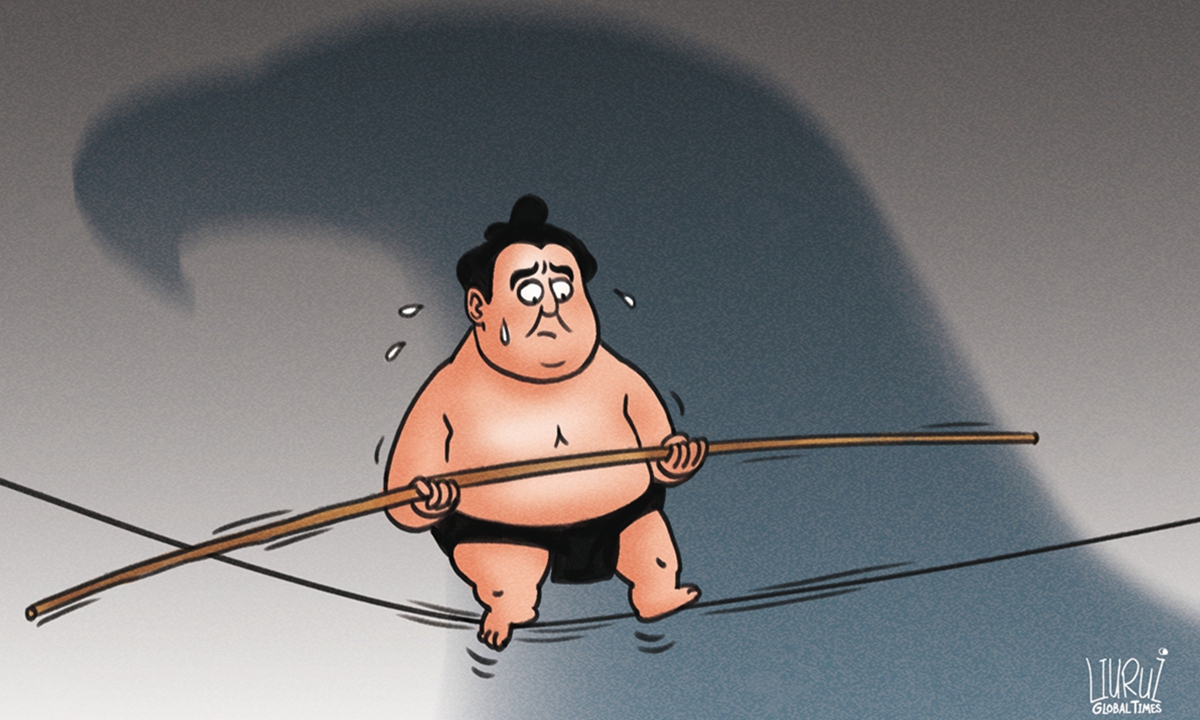
Illustration: Liu Rui/GT
The Japanese government has begun internal discussions over Washington's request for its allies, including Japan, to follow its lead on cutting China off from advanced semiconductors and related technology, and Japanese officials are weighing which export restrictions they can adopt, Nikkei Asia reported on Tuesday, citing an anonymous "Japanese government insider."
The report came weeks after Washington issued in early October what was said to be the "harshest" export ban on semiconductors and relevant chip technology to China. It remains to be seen if the Nikkei report is accurate and what decision the Japanese government will make, but the report clearly underscores the US' failure so far to get its allies on board and that it has to resort to economic coercion and even bullying to force allies to follow its lead.
None of the US' so-called allies have announced to implement similar export restrictions on China so far despite the US pressure, and many global chipmakers, including those in the US, have repeatedly warned of massive losses the export controls could inflict on their businesses. Against this backdrop, Washington is clearly aiming to step up pressure on allies, and Japan has become the main target. That has put Tokyo in a very delicate position, and the report of Japanese officials' so-called internal discussions could be a trial balloon to test China's reaction.
Commenting on the reported move on Wednesday, a spokesperson for the Chinese Foreign Ministry slammed the US' economic coercion and bullying, while urging "other countries to independently make correct judgments based on their own long-term interests and the fundamental interests of the international community."
Needless to say, a decision by Tokyo to follow the US' lead in any way will not bode well for itself, China-Japan ties as well as regional and global industrial chains.
There is no denying that Japan is indeed facing a tough decision, but the answer doesn't necessarily represent taking sides. Everyone knows clearly that China is the world's largest semiconductor consumption market, and "decoupling" from the Chinese market will be like strangling one's own domestic semiconductor sector. If Japan decides to follow the US' lead in imposing similar export controls on Chinese semiconductor companies, the Japanese semiconductor sector will not stand to gain anything. Japan's strength lies in chipmaking equipment and raw materials, while China is Japan's main importer of chipmaking equipments.
The stakes behind Japan's decision are high, because whether to join the US' export ban is not just a matter of losing market share in terms of semiconductors, but will also have significant implications for China-Japan economic and trade cooperation. What Japan needs to understand is that it cannot have it both ways in trade with China. Japan cannot seek to deepen cooperation with China in some areas that benefit itself, while working with the US on sanctions against China on semiconductor and other areas.
Therefore, Japan's decision could be seen as an indication of its sincerity in economic and trade cooperation with China. If China-Japan semiconductor cooperation could give way to the US' intervention and destruction of the global industrial chain, then there is every reason to be concerned about whether future cooperation between the two countries in other areas will also be unilaterally disrupted for any reason.
With the foundation and consistency of cooperation unguaranteed, businesses on both sides will adopt a very cautious attitude, which hurts bilateral cooperation. This will be dangerous for the Japanese economy, which is currently facing great pressure from soaring inflation and sharp depreciation in its currency due in large part to the US' aggressive monetary tightening.
The economies of China and Japan are highly complementary, and Japan has benefited greatly from China's manufacturing strength, supply chains and the Chinese market. In 2021, China-Japan trade reached $371.4 billion, up 17.1 percent year-on-year. China's imports from Japan totaled $205.5 billion, up 17.7 percent.
In terms of economics, Japan cannot afford taking sides. Also, a decision to follow the US' lead in such a highly destructive move could also further irreparably damage Japan's already dwindling credibility and regional and global standing as a major economy, because what Japanese officials decide could also have profound implications for regional and global industrial and supply chains.
Despite the US bullying, Japan still has a better option. It can join hands with other countries, including China, to resist the US' bullying. And Japan will have partners in this regard, as many other countries have also refused to follow the US' lead so far. Moreover, there is increasing pushback from global chipmakers, which are increasingly concerned about plunging sales and disruptions. Our advice to Japan: Look before you leap.




